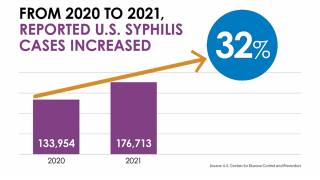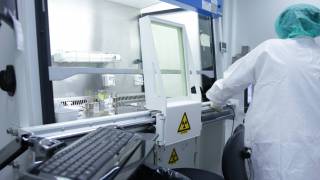Genital Chlamydia Vaccine Candidate Induced 100% Seroconversion

A therapeutic vaccine candidate against genital chlamydia was reported safe and immunogenic in a small phase I clinical study at Imperial College and Statens Serum Institute in London, England.
Additionally, the CTH522 vaccine-induced ‘seroconversion’ in all 30 women participating in this study, which was published on August 12, 2019.
This is important news since chlamydia, which is caused by an infection with Chlamydia trachomatis, is the most common sexually transmitted disease (STD) reported to Centers for Disease Control and Prevention (CDC) since 1994.
Left untreated, a chlamydia infection can result in pelvic inflammatory disease, which is a major cause of infertility, ectopic pregnancy, and chronic pelvic pain.
In 2017, a total of 1,127,651 cases of chlamydia were reported among females.
Moreover, the average annual increase in CDC confirmed chlamydia cases were 11.1 percent.
The CTH522 novel vaccine against chlamydia is given both as an adjuvanted intramuscular vaccine and an unadjuvanted intranasal vaccine booster.
Both vaccines were found to be immunogenic, although CTH522:CAF01 had a better immunogenicity profile, producing 5.6 times more antibodies.
The CTH522:CAF01 vaccine showed additional signs of better performance compared with CTH522:AH, including an enhanced mucosal antibody profile that serves as the first line of defense against the infection, and a more consistent cell-mediated immune response profile that is associated with long-lived immunity.
This first-in-human, double-blind, parallel, randomized, placebo-controlled trial was done at Hammersmith Hospital in London, UK, in healthy women aged 18–45 years. The primary study outcome was safety and the secondary outcome was humoral immunogenicity (anti-CTH522 IgG seroconversion).
Chlamydia can be easily cured with antibiotics, says the CDC.
Although medication will stop the infection, it will not repair any permanent damage done by the disease. Having multiple chlamydial infections increases a woman’s risk of serious reproductive health complications.
If a person’s chlamydia symptoms continue for more than a few days after receiving treatment, he or she should return to a healthcare provider to be reevaluated.
Unfortunately, repeat infection with chlamydia is common. Women whose sex partners have not been appropriately treated are at high risk for re-infection.
Women and men with chlamydia should be retested about 3-months after treatment of an initial infection, regardless of whether they believe that their sex partners were successfully treated.
And, infants infected with chlamydia may develop ophthalmia neonatorum (conjunctivitis) and/or pneumonia. Chlamydial infection in infants can be treated with antibiotics.
The study authors noted, as with other phase I clinical trials, the main limitation of the study was its sample size.
Writing in a linked Comment, Professor Toni Darville from the University of North Carolina, said in a press release, "A vaccine for prevention of C trachomatis infection would have enormous public health and economic impact.”
“Although clinical vaccine testing for chlamydia is in its infancy, this trial suggests optimism for the future."
This study was funded by the European Commission and The Innovation Fund Denmark. No researcher disclosed any conflicts of interest.
Our Trust Standards: Medical Advisory Committee
- afety and immunogenicity of the chlamydia vaccine candidate CTH522 adjuvanted with CAF01 liposomes or aluminium hydroxide
- Safety of Chlamydia Vaccine CTH522 in Healthy Women Aged 18 to 45 Years
- The Lancet Infectious Diseases: First ever phase 1 trial of genital chlamydia vaccine finds it is safe and provokes immune
- Risk of reproductive complications following chlamydia testing: a population-based retrospective cohort study in Denmark
- Chlamydiaceae: Diseases in Primary Hosts and Zoonosis
- CDC: Chlamydia


























